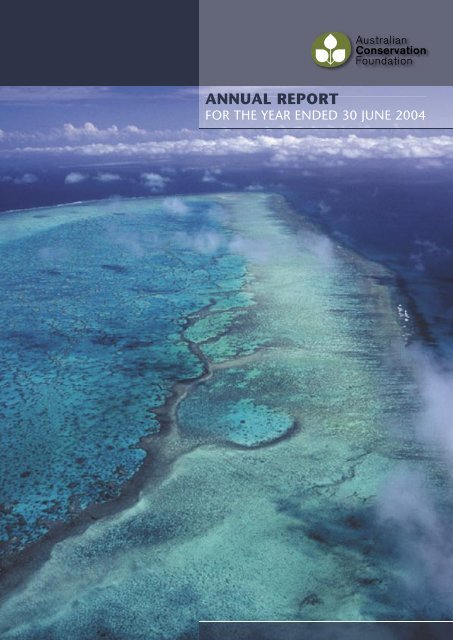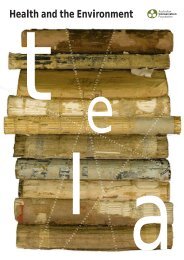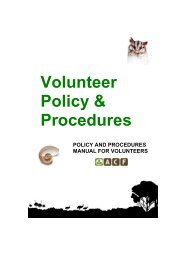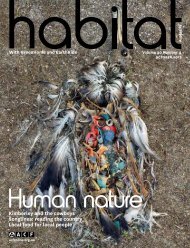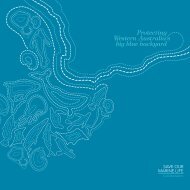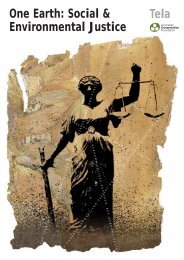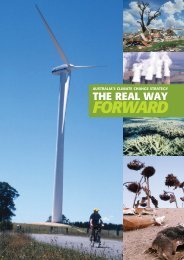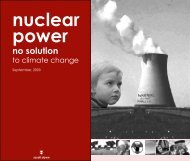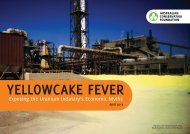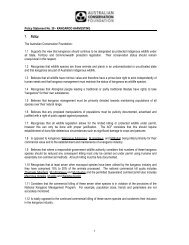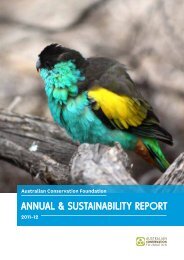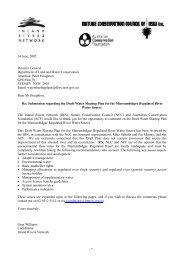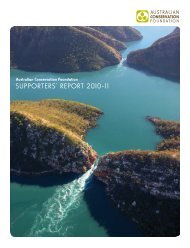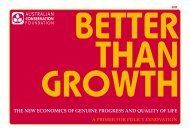ANNUAL REPORT - Australian Conservation Foundation
ANNUAL REPORT - Australian Conservation Foundation
ANNUAL REPORT - Australian Conservation Foundation
Create successful ePaper yourself
Turn your PDF publications into a flip-book with our unique Google optimized e-Paper software.
Use scientific, legal and economicand other relevant expertise todevelop campaigns and assesscampaign outcomes.ACF operates as a democratic and independent nongovernmentorganisation, dedicated to ensuring thatthe environment not only has a voice but that it getsheard. As part of our work to communicate ideas, policiesand solutions to the public and decision makers, ACFcommissions research that we use to develop campaignsand also to assess campaign outcomes.Over the past year, ACF commissioned a number ofreports and research papers that go straight to the heart ofACF’s sustainability agenda.These include:• Funding the Future: A Review of the NationalWoodlands <strong>Conservation</strong> Campaign and ACF/TWSForest Partnership. Report prepared by KirstenSaunders, August 2003.• Submission to the Board of Taxation on Charities Bill2003. Submission prepared by Leonie Thompson(Arnold Bloch Leibler) and submitted on behalf ofthe <strong>Australian</strong> <strong>Conservation</strong> <strong>Foundation</strong>, <strong>Australian</strong>Marine <strong>Conservation</strong> Society, <strong>Australian</strong> Rainforest<strong>Conservation</strong> Society, Clean Up Australia and CleanUp the World, <strong>Conservation</strong> Council of SouthAustralia, <strong>Conservation</strong> Council of Western Australia,Environment Victoria, Friends of the Earth, Greenpeace,Humane Society International, International Fund forAnimal Welfare, Nature <strong>Conservation</strong> Council of NewSouth Wales, Queensland <strong>Conservation</strong> Council, andThe Wilderness Society, October 2003.• ACF Analysis of the Australia-USA Free Trade Agreementand the Environment. Report prepared by Michael Kerr,March 2004.• The Financial Costs of an End to Logging in TasmaniaTogether Forests. Report prepared by GillespieEconomics, March 2004.• Potential Benefits of Competitive Neutrality forPlantations and Farm Forestry. Report prepared byMartin Jacobs and Associates, March 2004.• Corp-Rate. An Assessment of Australia’s Top 50Listed Companies in 2003. Research coordinated byRowena Joske, April 2004.• Floodplain Forests and Woodlands in the SouthernMurray-Darling Basin. Report prepared by Jane Roberts,June 2004.The Financial Costs of an End to LoggingACF commissioned Robert Gillespie of Gillespie Economics to assess the likely impact that protecting Tasmania’s High<strong>Conservation</strong> Value forests would have on timber industry businesses and employment. Gillespie Economics was ableto economically cost a plan that creates over a thousand local jobs for Tasmania at the same time as protecting around240,000 hectares of old-growth forest.The report, Financial Costs of an End to Logging in Tasmania Together Forests, identifies a number of potential changesto current timber industry operations to increase employment opportunities, including:• Support for higher value plantation management;• Retooling for the increasing plantation timber supplies;• Expansion of park and tourism infrastructure; and• Environmentally-sound downstream processing, and support for the hight value artisan sector.The report projects that with a modest investment of $250 million over five years by the federal government,over 1190 jobs would be created, more than offsetting the 320 that would be affected by the changes.5
OUR SOCIALPERFORMANCE‘It’s about People.’ACF’s vision for a sustainable Australia is about people –people protecting, restoring and sustaining theenvironment. ACF’s work towards this vision involvesa wide range of talented individuals and groups, from ourdedicated volunteers, Council, supporters and membersto our partner organisations and colleagues throughoutthe environment movement.Our staff are critical in the delivery of our aspirations.We need to recruit and retain a diversity of high calibrestaff, ensure they remain involved and motivated andsustain a learning environment that drives the attainmentof ACF’s conservation goals.We have sought to do this in professional, collaborativeand courageous ways. We have strengthened ACF by improvingteamwork and staff working conditions and invested inprograms to ensure continuity and quality of leadership.Strengthen ACF through teamworkacross the organisation and improvedworking conditions.Teamwork across the organisationACF offers an exit interview to all staff leaving theorganisation. The interviews provide an invaluableopportunity to identify trends and tap into people’sworking experience at ACF in order to identify what needsimproving or addressing in order to retain high calibrestaff. In 2003 exit interview analysis identified an aspirationfor more team based work, collaboration and acrossorganisation engagement. Keynote campaign teams werecreated partly in response to this need.Lake Gairdner, salt lake, SouthAustralia.PHOTO: Jean-Paul Ferrero/AUSCAPEKeynote teams include staff from campaigns,communications, marketing and operations. The teamswork on campaigns that are critically important in achievinga sustainable Australia and aim to inspire action bysupporters, generate new supporters and provide a basis forACF’s outreach to a broad cross section of the community.Staff Profile – Julie Taylor MillsACF is committed to attracting skilled, passionate and highly motivated staff who share our values. Julie Taylor Mills,our Climate Change Leaders Program Coordinator, talks about her work.My role is to work with the business community and engage them on the issue of climate change – to pulltogether corporate leaders who want to see Australia take action on planning for a carbon constrained world. A typicalday involves spending time reviewing the media, seeing what is new on the climate change front, assessing researchand a lot of time on the phone talking to people we refer to as champions within industry.The best thing about my job is the opportunity to work with a group of like minded people – the marriage ofvalues and ‘bringing home the bacon’. I have worked in many organisations and this is far and away the happiest,smartest and most enthusiastic bunch I have ever been part of. And I get to meet the great people out there in industrywho seek to make a difference in their organisations and create change.Outside of work I’m interested in environment and social justice issues. Then travel, camping, tennis, reading,sewing, knitting and lest I forget, all the other things a mother of three has to be involved in…with a little time leftover for my masters research which is limping along.What’s my dream job? It’s corny, but true – I have it. When I went back to study, I gave myself the objective ofbecoming a corporate campaigner for a green group … and I have done it! And, better still, it is an organisation I havebeen a member of for 15 years!!!6
Leadership Program: DevelopingSustainable People StrategiesACF has invested in an all of staff Leadership Program toensure continuity and quality of leadership and to sustaina learning environment that drives the attainment of ACF’sconservation goals.An across organisation team was established to leadthe design and implementation of the leadership program.A staff survey helped clarify the link between leadershipand the characteristics/quality of the organisational culture.The leadership style at ACF is intuitive and creative, not afraidto take risks, adept at seeing the big picture and recognisingnew possibilities. The “intention to stay” indicators arehigh, highlighting that ACF staff are highly committed andmotivated to continue working at ACF. However the surveyalso indicated that work based stress and pressure was notalways managed effectively and that behaviour displayed intense situations was not always appropriate.The objective of the Leadership Program is to enhancethe leadership culture and effectiveness of ACF. Theprogram was offered to all staff and had a very high rateof staff participation. Several modules were offered to buildlong term tangible strengths and attitudes, based aroundpersonal awareness, emotional intelligence, coaching forthe development of others, interpersonal/leadership skillsdevelopment, team dynamics and negotiation.ACF staff more productivein our new green officeKodo International, office performance andproductivity analysts, completed detailed analysisof the effects on staff of ACF’s new green head officeat 60L compared with our old head office. In threeseparate surveys ACF staff rated the performanceof our office and workspaces in categories suchas from comfort, lighting, noise, atmosphereand temperature.Kodo concluded the new building rated as oneof the most effective spaces they had ever tested.Estimated productivity improvements (almost10 per cent as compared to the <strong>Australian</strong> benchmarkof 0.4 per cent) show the extent to which ACFstaff believe their productivity at work is positivelyinfluenced by the building design and facilities,environmental conditions and workspace features.Leadership Training at ACFIt has been a privilege watching the team at ACF developmore personal awareness and take responsibility andownership. The sponge like desire for learning andchallenging the “way things are done” around here hasbeen truly inspirational.The outcomes of the program so far vary from simplechanges such as individuals’ ability to resolve “people”issues on their own without additional intervention tosignificant personal development of leaders willingto change their approach to achieve mutual outcomes.ACF stands alone in its desire to demonstrate themessages it sends (i.e. walk the talk) and this programis no exception. Whilst there is always more to bedone, this group has clearly demonstrated changedbehaviours and a desire to achieve more. Bottom lineresults include greater productivity through time savedin “managing the people”and increasing the capacityto achieve incredible resultsfor Australia’s environmentby acting courageously anddoing things differently.Louise QuinnLearning Dimensions Facilitatorof ACF’s Leadership ProgramSalaries/ConditionsIn 2003 ACF identified that its salaries were well below thoseof comparable organisations and invested in more competitivesalaries to attract and retain highly skilled staff, althoughsalaries at some levels still fall short of the agreed targets.A consultative process between staff, management and Councilresulted in ACF also being in a position to offer improvedworking conditions. Focussing on sustainability and work/lifebalance, these include up to twelve weeks paid parental leave,paid study leave, early access to long service leave, flexibleworking hours and flexible access to personal leave for carerresponsibilities, sick leave and bereavement leave.To affirm and strengthen the linkbetween indigenous and othercultural values and protection ofthe environmentNorthern Australia focusIn 2004, ACF’s Northern Australia program began inearnest thanks to the generosity of the Thomas R. Kantor<strong>Foundation</strong>. ACF will work in partnership with Indigenousgroups, scientists and other environmental organisations toensure the protection of the natural and cultural heritage ofNorthern Australia. With particular focus on the ecologicalintegrity of the Kimberley, Cape York and Kakadu regions,ACF wants to make sure that any development in theregion is sustainable and most importantly, respects therights of traditional owners.7
immediate plans to re-sign a Memorandum ofUnderstanding with Genetically Modified (GM) cottonproponent Western Agricultural Industries, which expiredon 30 June 2004. The people of the Kimberley had foughtagainst the project – which would double the State’sannual water use, clear 200,000 hectares of woodland andintroduce a genetically modified crop into a near pristineenvironment – for over six years.In June 2004 ACF, the Kimberley Land Council andEnvirons Kimberley signed a Letter of Agreement committingthe groups to work together to protect “the Kimberleypeoples’ culture and to look after the land, with all its plantsand animals”.The agreement included a call to scrap plans for broadscale irrigated cotton growing in the Kimberley, and saysthat water resources should be controlled by the regionto ensure sustainable cultural, social and environmentalbenefits. The groups also agreed that Aboriginal TraditionalOwners of the Kimberley have the right to keep theirtradition of looking after land and sea country in theKimberley, including deciding appropriate developmentsand conservation parks.Not one month after the signing of the agreement,ACF and Environs Kimberley were welcoming the newsthat the Western <strong>Australian</strong> Government had noStrengthen links with regional andinternational environment movementACF’s commitment to collaboration ensures that supportingand strengthening the environment movement is a keyfocus of our activities.ACF auspices the Mittagong Forum which bringstogether 20 key environment organisations from aroundAustralia to network, dream and develop. It has beena key factor in ensuring the environment movement canspeak with one voice on the major environmental issuesfacing Australia.ACF is also a founding member of the Northern AustraliaEnvironment Alliance that is bringing together the keyenvironment organisations across northern Australia toensure more effective relationships and activities.ACF values this collaboration with a significantcommitment in both dollars and time. ACF’s overallfinancial contribution to other organisations that haveshared environmental objectives, like the Mittagong Forum,although slightly less that the previous year, amounts toover $350,000 per annum, which is five per cent of ouroverall operating expenditure. In addition our 2003 analysisrevealed that ACF staff provide in excess of a week of theirtime per annum to supporting other groups.Passion for Northern Australia lives onDuring his short life Tom Kantor energetically pursued hisinterests and passions for people and country in Northern Australiawith an active commitment to conservation and Indigenous issues.When he died in January 2001, aged 35, he was greatly aware ofthe need for restoration and protection of Northern <strong>Australian</strong>landscapes in a manner that was mindful of both Indigenous cultureand conservation.ACF is now very proud to be able to follow through on Tom’spassions. With significant funding from the T R Kantor <strong>Foundation</strong>,and generous support from ACF donors, we have been able to embarkon an expanded and comprehensive conservation program forNorthern Australia. The program will further both Tom and ACF’sshared goals for conservation through innovative partnerships withtraditional landowners, environment groups, scientists and othersto protect the North from inappropriate development.ACF would like to record its thanks to the Kantor family for theirinspired gift in Tom’s memory towards these goals.8
Making East Timor “green and fresh”East Timor may be the world’s newest independent nation but it has already recognised the economic potential ofthe environmentally conscious traveller. So much so that responsible tourism and environmental justice have a placein the country’s new national Constitution. And an eco-tourism village – Tua Koin – has already been established onAtauro Island by a community organisation.The government is keen to promote East Timor as an eco-tourism destination to the rest of the world, and isdeveloping a National Tourism Development Plan that emphasises environmental sustainability. However, muchcredit for greening East Timor’s constitution should be paid to the environmental non-government organisation(NGO), Haburas.Meaning ‘to make green and fresh’, Haburas was set up in 1998 to campaign on marine protection, deforestationand ethical tourism, amongst other things. In 2004, founder Demetrio do Amaral de Carvalho received the GoldmanEnvironmental Prize in recognition of his work to conserve East Timor’s environment and assist communities as wellas spearheading the inclusion of environmental articles in the national Constitution.ACF began working with Haburas in 2001 to explore sustainable development options for the future. A three-yearcapacity building program was developed to help Haburas contribute towards the ecologically sustainable managementof East Timor’s environment and natural resources.As part of the capacity building program, ACF has hosted several members of Haburas in Australia, organisedstudy tours and workshops with a focus on sustainable agriculture, and provided training (either directly or throughengaging third party experts) in areas like accounting, coastal management, environmental impact assessment andsustainable solutions to poverty.ACF and Haburas have also collaborated with Roman Luan, the Atauro-based community NGO responsible for theTua Koin eco-tourism village. With funding from the Poola <strong>Foundation</strong>, ACF’s Ecotourism project with Haburas andRoman Luan began in 2002 with the goal of alleviating poverty at the community level through the promotion ofsmall-scale ecologically sound community-based tourism.Though ACF’s funded capacity building program with Haburas has now ceased, ACF intends to keep in closecontact with Demetrio do Amaral de Carvalho and the rest of the organisation, and continue to support them throughnon-financial means in whatever way we can.9
OUR ENVIRONMENTALPERFORMANCEProvide environmental leadership bygenerating, harvesting and communicatinginnovative ideas and actions.Natural Advantage“Natural Advantage”, ACF’s ground-breaking report outlinedour vision for a sustainable Australia. In it we identified thechallenges that our economy – grossly inefficient in energy,materials and water – presents, and provided real pathwaysto a highly efficient sustainable economy.This vision for Australia has challenged ACF to lookinto our own backyard to ensure that as an organisation,our environmental campaigns and programs and ourinternal systems are providing environmental leadership.We seek to be known as an organisation that is preparedto ‘walk the talk’ by implementing the innovative ideasand actions we are promoting publicly.In response ACF has developed many leadingenvironmental practices.Green head office buildingACF is the main tenant in one of Australia’s premiergreen buildings at 60 Leicester Street, Carlton. 60L haswon numerous awards for its environmental leadershipin the commercial office building sector. To create a trulygreen office environment ACF set about researching andsourcing sustainable materials for its fit out. The resultsof this extensive process are available on ACF’s website atwww.acfonline.org.auGreen power for our officesOne hundred per cent of our head office based energy useis sourced from certified new green power, to ensure ouroffice activities have the lightest possible footprint andto encourage development of the new energy sources ofthe future. Overall 82 per cent of our total energy needsare sourced from green power, with only our sub-let officespaces not utilising green power sources.Energy efficient computer technologyOur new head office thin client network is estimated toreduce our overall office computer energy needs by around30 per cent. The thin client computers are less materialsintensive, require less staff time to maintain and willreduce the passive heating effects of computer systemswithin the office space reducing the need for cooling inthe summer months.Email communications with supportersOur email newsletter is now received by thousands ofmembers and supporters and we continue to expand ourelectronic communications to reduce our printing anddistribution impacts;Office recycling systemsThese systems ensure materials are sorted into 5 differentstreams including green waste for composting, beverageWistari Reef, Capricorn Coast, Queensland.PHOTO: Andrew Teakle/TESSERAand food containers for recycling, paper products forrecycling, corks for recycling and finally any materialthat can’t be recycled.Office printing and copyingOffice computer printing defaults are set for dual sidedprinting or for printing on reused office paper, whilemultiple page printing available on the our officeprinter/copier. Recycled paper is used for all printingand photocopying.10
EmploymentFull time Full time equivalent equivalent120 120100 10080 8060 6040 4020 200 10 2 1 3 2 4 3 5 4 6 5 7 6 8 7 9 8 109 1110 1211 12Production Layer Layer * *Capital Capital imports importsImports ImportsDomestic Domestic capital capitalFood FoodManufacturingConstructionTrade Trade and and repairs repairsHospitalityTransport Transport and andcommunicationsPrivate Private services servicesACF ACF direct direct and andPublic Public Services Services* Production * Production layer layer data with data withless than less two than decimal two decimal places placeshas been has been excluded excluded for clearer for clearerpresentation presentation of this of graph. this graph.Note: Production layer refers to each supplier stage in the economic system that a product or service goes through to reachACF eg. ACF purchases a product from a supplier who purchases materials from another supplier. The above example shows theemployment component built into these layers.ACF surfing upstreamACF has in the past focused its analysis of environmentalimpact solely on its internal activities such as travel,printed materials and catering. This analysis tells thestory of our environmental performance within our ownbackyard, but stops at the doors of our offices. Yet all ofACF’s suppliers, and their suppliers, “upstream” throughthe economy are impacting the environment as part ofservicing ACF activities.ACF is a pilot partner in a University of Sydneyproject, to develop a web based software package that willenable anyone to get a more complete picture of theirenvironmental impacts, both in house and upstreamthrough the economy via their suppliers.Up until now quantifying and analysing impacts suchas these would have required expensive highly specialisedlife cycle analysis. This is now changing thanks to theUniversity of Sydney’s Integrated Sustainability AnalysisFramework (ISA) tools from which ACF is helping to pilot.The ISA tool allows a whole of business analysis ofupstream impacts in a broad range of measures such asecological footprint, greenhouse gas emissions, energy,water and employment. The graph below focuses on onemeasurement, employment, as an example and shows keysectors of the economy that, in effect, employ staff as aresult of goods and services purchased by ACF.The graph shows that ACF’s direct employment, of justover 50 staff, is the largest component (classed as Publicservices in the graph – the large pale green section atthe bottom). The advantage of the ISA process is that italso quantifies the additional effect of ACF’s operationsaccording to the products and services that ACF purchases.For example in supporting ACF’s work:• The Private Services (accounting, legal services, etc),the next largest sector, employs the equivalent ofabout 20 staff.• The Transport & Communications, the third largestsector, employs the equivalent of about seven staff,Another example of this upstream effect is that, eventhough ACF purchases green power, a significantcontributor to ACF’s overall ISA footprint is theelectricity used by ACF’s suppliers. We will need toachieve our campaign goals of greater renewable energyuse and increased efficiency to significantly reduce thisupstream effect.For more information about the ISA and itsapplications, visit http://www.isa.org.usyd.edu.au/11
ACF’s Ecological FootprintACF continues to be a pilot partner with the VictorianEPA’s Ecological Footprint Project. Participating in the EPAfootprint and the ISA project allows us to contribute to thetwo leading programs in this area and provides a usefulcomparison between them. The following table comparesthe footprint results determined by the two methods.Note: The EPA result for 2003 includes activities from ACF’shead office only. The 2004 EPA result and the ISA resultsencompass all ACF activities.The EPA analysis is focused only on ACF internal activitiesand as a result yields a significantly lower footprint inhectares to the ISA analysis, which includes the impacts ofACF’s upstream suppliers. The EPA results are up in 2004because it includes the activities of all ACF offices, highertravel impacts due to additional staff based in remote officesand increased activity in our Melbourne office.Interestingly, the ISA analysis, which calculates roughly2.5 times more impact than the EPA result, due to theupstream impacts, remained stable at 400 hectares despitesignificant increases in the various underlying activitiescontributing to the result. This implies some increasedefficiencies in ACF’s activities.hectaresFootprint5004003002001000EPA 2003 EPA 2004 ISA 200412
OUR FINANCIALPERFORMANCERevenue $7,309,284Unrestricted revenue growth $1,151,920Reserves $4,063,400Financially it has been quite an amazing year at ACF. Theorganisation has benefited from substantial growth in ourEarthfund regular giving program, the gift and bequest ofhouses and fabulous new fundraising opportunities such asthe Art Project “Australia Felix” with Port Jackson Press.In 2004 ACF revenue hit an all time high, exceedingthe previous record result of 2003 by $541,019.The expenditure on new fundraising capacity in 2002–2003 delivered significant unrestricted income growth for theorganisation, giving ACF the flexibility and strength to meetthe environmental challenges ahead. Environmental programexpenditure increased by 7% compared with 2002–2003,This inspirational performance is attributable to ourpassionate and committed supporters, who so generouslyexhibit their concern for the <strong>Australian</strong> environment.Record revenue has provided new funding forenvironmental programs including:• Northern Australia – our program, in partnership withthe numerous indigenous communities, to protectAustralia’s great northern treasures of Cape York,Kakadu and the Kimberley;• South Eastern Marine – seeking better protection for ourSouth Eastern Marine environments funded throughthe Department of Environment and Heritage;• Climate Leaders – our corporate partnership withprogressive companies encouraging proactive actionson climate change• Building Green – working to green the corporate builtenvironment;• Energy – working to achieve better environmentaloutcomes with significant climate change impactingindustries; and• Green Home – our program to assist households toimplement sustainability strategies in their own home;Yet for ACF to remain Australia’s leading environmentgroup it is vital that our financial capacity continues to beas rewarding and efficient as our environment programs.To this end ACF’s has continued its investment in futurefundraising income with an increase in fundraisingexpenditure of 20% or $449 371.The overall result for the year was a deficit of $264 382,driven largely by increased fundraising expenditure. Thedeficit was significantly better than that budgeted for.ACF’s financial position remains strong withaccumulated reserves at just over $4,089,448.Approximately 53% of ACF’s reserves are allocated tospecific environmental campaigns over the next few years.The remaining 47% unrestricted reserves provide financialsecurity for the organisation; this is well within theCouncil’s required minimum reserve levels equivalent to3 months of unrestricted operating expenditure.50000004000000300000020000001000000ReservesRestricted Unrestricted8000000600000040000002000000RevenueRestriceted Revenue Unrestricted Revenue1302003 200402003 2004
Environment programs, fundraising and administrationEnvironmental programs spending is up by seven per cent to $3,236,660, which has added significant new capacityin the Northern Australia, marine, climate change and greenhome campaigns.ACF has increased investment in fundraising (both in dollar and percentage terms) and this expenditure isdelivering additional unrestricted income. Income from our Earthfund regular giving program more than doubledthis year to $2,100,000. The percentage of spending on fundraising is anticipated to reduce in coming years asincome generated by new supporters allows for the expansion of ACF’s environmental programs.8000000600000040000002000000Environmental programs, Fundraisingand Administration RatioNOTE: The information disclosed in these ratios hasbeen prepared in accordance with the <strong>Australian</strong> Councilfor International Development’s Code of Conduct, whichrequires members to consistently allocate expenses to thecategories. This allows for comparison between memberagencies. Comparisons with other non-profit organisationswho may disclose this information, but do not follow theCode of Conduct compilation requirements may lead readersto draw inappropriate conclusions about their and ACF’sperformance.0Environmentalprograms2003 2004Fundraising:new supportersFundraising:existing programsAdministrationIncrease financial support to enableplanned growth in environmentalprogram capacityACF’s fundraising performance for the year was one forthe record books.Highlights included:• Our Earthfund regular giving program revenue morethan doubled to $2,100,000 ($900,000 in 2003),• Our first tax deductible gift of property worth over$600,000 thanks to Mr Bill Paine who donated hishome to ACF; and• Our biggest restricted program gift commitment of$2,000,000 over the next four years for the NorthernAustralia Program thanks to the TR Kantor <strong>Foundation</strong>These significant milestones are the result of ACF’sincreased investment in fundraising over the past yearand the generous giving of our members and supporterswho provide more than 91 per cent of ACF finances (seethe sources of ACF income below), which ensures ACFcan continue to be a strong independent voice, speakingwithout fear or favour, for the environment.Sources of ACF IncomeSupporters91%Government 6%Business 3%14
Generous Gift Inspires OthersACF is grateful forthe many generousdonations made everyyear that allow us tocontinue the work ofprotecting, restoringand sustaining theenvironment. Bill Painewas one of those whocontributed duringthe 2003–04 financialyear; but unusually,he donated his house. Mr Paine’s highly generousdonation struck a chord with others and has inspiredpeople to contribute in a range of different ways.When the news of Bill Paine’s generous giftreceived coverage in the media, it raised a lot ofinterest. Some people found the gesture noble; othersfound it hard to comprehend. Opinions were splitwhen readers discussed the donation on The Agewebsite. “Bill Paine is gutsy and inspiring,” wrote one;“charity begins at home,” reasoned another, who said itis better to look after your family than give to a charity.Coverage of the donation had a flow-on effect.There was an increase in the number of peoplebecoming members via the ACF website. One manwho heard Bill Paine interviewed on the radio decidedto donate a month’s salary.Simone Rosel, ACF’s Donor Liaison Officer, saysdonations like Mr Paine’s encourage others to considerthe impact they have on the environment and waysthey could help improve its health.“This is a significant gift – and not everyone cando this. But there are many ways to contribute to ACF’swork: you can make a one-off donation, a monthlycontribution, volunteer some of your time, activelysupport ACF campaigns by writing letters or phoningtalkback radio, or by leaving your own legacy througha bequest in your will.”Corporate PartnersACF continues to grow and develop relationships with<strong>Australian</strong> businesses and their employees. In 2003/2004corporate partners made $152,800 in donations andprovided $200,000 plus in pro bono services.ACF’s alliance with Southcorp Limited has continuedto provide support for our sustainable rural landscapesprogram. An important part of this work over the pastyear has been the development of tools to identifyand manage biodiversity in the vineyard and otheragricultural environments.Workplace giving is a growing method for the staff ofparticipating companies to support the causes for whichthey are passionate. ACF is grateful for their support bothfinancially and because it enables us to reach a muchwider range of people who care about the environment.We also thank the companies involved for supportingthese programs in many cases with dollar for dollarmatching gifts.Existing workplace giving partnerships havegrown and deepened during the year as informationand experiences are shared between ACF and thecompany and its staff. ACF currently has workplacegiving partnerships with Mallesons Stephen Jacques,<strong>Australian</strong> Taxation Office, Aviva, and Corrs ChambersWestgarth. In addition a number of supporters makeindividual contributions via their company’s workplacegiving programs.One of the most pleasing outcomes of ACF’scorporate partnerships has been the pro bonocontributions of professional services to support ourenvironmental programs. In particular we are verygrateful for our ongoing relationship with ArnoldBloch Leibler who have supported ACF with pro bonolegal assistance.Although ACF has not been able to formally quantifyand include pro bono contributions in its financial resultswe estimate these contributions have provided at least$200,000 worth of legal, research and other professionalservices to ACF.ACF Investments Guidelines and PerformanceIn July 2002 ACF’s Council approved a new Guideline for the selection, management and reporting of ACF’s Investments.The guideline was developed with advice from Ethinvest, one of the original ethical investment advisory companiesin Australia. The guideline defines ACF’s risk return profile, authorised and unauthorised investments, short, medium andlong term strategy, performance benchmarks, investments approvals and reporting.A key requirement of the guideline is the requirement to analyse all investments for conflicts with ACF’s Councilapproved policies, which cover a broad range of economic, environmental and social issues.As a result of the change ACF now has a far greater mix of investments including direct mortgages (<strong>Australian</strong> SecuritiesLimited), ethical equity funds (<strong>Australian</strong> Ethical Investments and Hunter Hall), direct property (Unit and House in Sydneyand Unit in Melbourne) and listed property trusts (ING and Macquarie).ACF investments are now much more aligned with our organisational goals and objectives, but have also providedexcellent investments returns (almost double that anticipated under the old investment mix).15
<strong>ANNUAL</strong> FINANCIAL <strong>REPORT</strong>FOR THE YEAR ENDED 30 JUNE 200416
Review issues relating to goodgovernance to ensure capacityand flexibility to meet changingenvironmental needsACF is a democratic, membership-based organizationwith individual members from all States and Territoriesof Australia. It is incorporated in the <strong>Australian</strong> CapitalTerritory. ACF members elect the Council on a tri-annualbasis (the current Council was elected in November 2003).Members also contribute to ACF via branches, input tochanges in policy (members are given an opportunityto comment on all new policies and policy revisions)Organisation ChartFINANCECOMMITTEEAdvisory role toCouncil/ExecutiveMEMBERSBRANCHESCOUNCILWho? Elected members:5 from each State, 3 from ACT and NT,President and Treasurer.What? Set Strategic direction,campaigns and appoints executive.EXECUTIVEWho? President, Treasurer,2 Vice Presidents and 4 Councillors.What? Administration, budgets,implementation of policies/strategies/plans, financial and staff management.EXECUTIVE DIRECTORWhat? Responsible for theimplementation of theorganisations strategyNATIONALMANAGEMENT TEAMWho? Executive Director,Campaigns Director, StrategiesDirector, General Manager,Communications Director,Marketing Manager, HumanResources Coordinator, Legal Advisorand Finance Manager.What? Assists the ExecutiveDirector in the managementof the organisationSTAFF & VOLUNTEERSand of course with their financial support and personalactions for the environment.The governing authority of the <strong>Australian</strong> <strong>Conservation</strong><strong>Foundation</strong> is its Council, which is made up of:• 5 members for each of the 6 States;• 2 members for the <strong>Australian</strong> Capital Territory; and• 3 members for the Northern Territory.Council meets over a weekend at least three times each yearin Melbourne. Councillors appoint both a Treasurer andPresident who are usually chosen as ‘specialists’ for theseroles. Council sets ACF’s strategy and policies, determinescampaign priorities and directions, and to ensure thatthere is an effective Executive appointed to oversee theadministration of ACF. Council also appoints and evaluatesthe performance on the Executive Director who is delegatedresponsibility for delivering Councils plans.The Executive consists of the President, the Treasurer,two Vice-Presidents and four other councillors who areelected by the Council on an eighteen-month term. Thereare at least six meetings of the Executive each year, whichmay be conducted by telephone conference or electronicmeans. The role of the Executive is to ensure ACF is runefficiently and effectively, that budgets are responsiblyprepared and observed, that good financial and staffmanagement is provided and that plans, policies andstrategies established by the Council are followedand implemented.Council review and update the strategic planencompassing ACF’s vision, mission, values, philosophyand objectives and strategies. Each year the Councilapproves ACF’s budget and annual plan, which set outACF’s core activities plans and performance measuresfor the coming year.At the end of the financial year Council ensureACF prepares its annual financial report outlining theperformance, position and cash flows for the financial year.ACF CouncillorsPresidentProf Ian LoweThis position was vacant between June and December 2004following the resignation of Peter Garrett.Professor Ian Lowe AO is emeritus professor of science,technology and society at Griffith University in Brisbane,an adjunct professor at Sunshine Coast University andQUT, an honorary research fellow at the University ofAdelaide and a consultant to the CSIRO Division ofSustainable Ecosystems.TreasurerMr Kester BrownKester has been involved with ACF in the position ofTreasurer since November 2002. He is a Principal atErnst & Young and works in the areas of audit, acquisition,due diligence and capital raisings. Kester has an interestin building the internal controls and financial strengthof ACF.i
<strong>Australian</strong> Capital TerritoryMs Caroline Le CouteurCaroline is a director of <strong>Australian</strong> Ethical InvestmentLtd, and has served four previous terms on ACF Council,this being her fifth. She has a keen interest in urbansustainability issues: lifestyle, building, transport, urbanplanning and energy. Having previously worked at the<strong>Australian</strong> Greenhouse Office on renewable energy,Caroline is now walking the talk by retrofitting anex-government house to be solar passive. Her understandingof energy issues and the links to everyday life bring valuableinsight to Council.Mr Warren NichollsAn environmental consultant, Warren has a 25 year historyof work for the Commonwealth Environment Department.Since leaving the public service he has providedenvironmental services in Australia, South Africa, andSouth America, as well as a year as ACF’s National LiaisonOfficer. Biodiversity, climate change, salinity and forestconservation are Warren’s priorities for this, his debut termon ACF Council.New South WalesMs Penny Figgis AMPenny has a long history with ACF, and is now in hereighth term on Council. She is now Vice President ofCouncil. She has a varied environmental history, havingheld places in many environmental organisations andstatutory bodies. She has a particular interest in biodiversityconservation and protected areas, and has been honouredfor her environmental work with an Order of Australia(1994), and a Centenary Medal (2003).Dr Phil McManusPhil is embarking on his second term as an ACF Councillor.As a Senior Lecturer in Geography and Director ofEnvironmental Science at the University of Sydney, Philhas a particular focus on urban sustainability. He is aformer Convenor of the ACF Sydney branch.Mr John SinclairJohn served as an ACF Councillor for 14 years between1975 and 1989, and as Vice President for 10 of those.He has held leading roles in several other environmentorganisations, as well as being an ecotour safari guide,and has been awarded that Goldman EnvironmentalPrize (1993) and listed in the UNEP’s Global 500 for hisenvironment work.Mr Ross TzannesRoss is both a solicitor and National Convenor of theenvironment network of the peak national bodyrepresenting ethnic communities. He has a particularinterest in involving ethnic communities inconservation and has been involved in a number ofenvironmental awareness programs targeting thosecommunities. Ross is currently serving his third termas an ACF Councillor.Dr Colleen Watts OAMHaving served half a term already, Colleen is nowbeginning her first full term on ACF Council. She isa sustainable farmer and manager of a solo rural medicalpractice in the central Tablelands of NSW. Colleen hasextensive academic and practical experience in rural waterissues, dry land salinity and waste. Involved in Landcareon both regional and property level. Board member ofNSW Environment Protection Authority. She has a catholicinterest in all environmental issues, especially sustainabilityand natural resource management.Northern TerritoryMr Paddy O’LearyPatrick currently holds the position of Marine andCoastal Policy Officer for the Northern Land Council, NT.Previous to this he was the NT Regional Coordinator forthe marine and Coastal Community Network. He has avery solid grounding in marine and coastal issues, andhas experience of indigenous land management issues.He holds an Honours degree majoring in Ecological Scienceand has worked on river conservation and forestry andwoodchipping issues as well as contributing as a committeemember of the Environment Centre of the NorthernTerritory. He has provided training on community basedmarine protected areas to some of ACF’s overseas projectpartners in East Timor in partnership with ACF’s Asia PacificUnit. This is Patrick’s second term on ACF Council.Mr Mark WakehamMark is now on Council for his second term. He is one ofthe coordinators of the NT Environment Centre. He hasa particular interest in increasing the capacity and theresources for environmental campaigns in the top end.This interest drove his contribution to the establishmentof the Northern Australia Environment Alliance, of whichACF is a part, in an attempt to coordinate NT campaignsmore strategically. Mark was also heavily involved in thecampaign against the Jabiluka uranium mine.QueenslandDr Elaine HardingElaine is a conservation biologist, now lecturing in the Schoolof Tropical Environment Studies and Geography at JamesCook University. Her career has included ecology work for theUS government and private consulting firms. She has a keeninterest in translating scientific data to publicly accessiblemessages which change social behaviour towards theenvironment. This is Elaine’s first term as an ACF Councillor.Ms Kristin KeaneBased in Cairns, Kristin is vice president of the Cairnsand Far North Environment Centre and has been on themanagement committee for more than three years. In thistime she has been involved with local, regional, state andnational issues such as Cape York, the Great Barrier Reefand Wet Tropics as well as representing the organisation onvarious local committees and at forums and workshops.ii
Ms Lyn WallaceLyn is a senior environmental planner with the QueenslandEnvironmental Protection Agency. She has worked formany years in a variety of capacities with the Cairns andFar North Environment Centre and the North Queensland<strong>Conservation</strong> Council. She brings to Council her expertisein environmental policy and decision making, indigenousland management, protected area management and privateland conservation.South AustraliaDr John CoulterJohn Coulter returns to ACF Council after he served17 years from 1973–1990. John was a Democrat Senatoruntil the mid 1990s, in which capacity he made severalfederal inroads to greenhouse research and ozoneand threatened species legislation. John went on tolecturing (Australia and internationally) and conferenceorganisation. His passion lies in finding ways to combatthe cause of environmental degradation, (unbridled‘growth’), rather than just the symptoms.Mr Simon DivechaSimon is in his first Council term. He is a director ofGreen Matters Group, which focus on environment andecological footprint work with businesses, in collaborationwith California-based Global Footprint Network(www.footprintnetwork.org) and others of its <strong>Australian</strong>partners. Formerly the CEO of the <strong>Conservation</strong> Councilof South Australia, Simon has worked extensively acrossenvironmental and social issues, internationally, as well asat national and local grassroots level. This includes leadingcampaigns across Asia Pacific region with Greenpeace andthe Mineral Policy Institute.Mr Robert FowlerRob is an environmental lawyer, serving his third termon ACF Council. Rob has spent recent years working onenvironmental law training in Indonesia and India. He isChair of the Environment Defenders Office, SA, and stateshis main environmental concerns as being law reform, landclearance, climate change and water issues.Ms Katherine WellsKatherine has already served half a term as an ACFCouncillor (embarking on her first full term in 2003) and isa member of ACF Executive. Katherine is an environmentallaw and policy consultant, and has worked for both theenvironment movement and industry. She co-founded theVictorian Environment Defender’s Office and has spentmuch of her career lobbying governments and advisingenvironment groups on a wide range of environmentallaw reform issues. Her particular interests at present areclimate change, and the emerging biodiversity crisis. Sheis Deputy Chair of the South <strong>Australian</strong> Premier’s RoundTable on Sustainability, and a member of the ExecutiveSteering Group for the development of South Australia’sGreenhouse Strategy.TasmaniaMr Doug BrownDoug is in his third term on ACF Council. The majority ofDoug’s environment work has focussed in the protectionof the Tarkine, Australia’s last great temperate rainforest.He also represents the Launceston Environment Centre onthe Environment Tasmania Council (ET), and is a memberof the ET Executive Committee, as well as serving as LEPrepresentative on the Northern Tasmanian Natural ResourceManagement Association.Ms Helen GeeLiving on a grazing property on Tasmania’s east coast,Helen manages her native bush, grassland and pasture forlong term sustainability. She is a founding member of TheWilderness Society, and has produced/edited environmentbooks of significant influence (the sales from one of whichfunded an ACF project officer to campaign against thedamming of the Franklin). She is current convenor ofthe South East (TAS) Forest Protection Group; NationalConvenor, Lake Pedder Restoration Committee; Campaignofficer, Tas. National Parks Association and works onLandcare and other land restoration projects in Tasmania.This is Helen’s second Council term.Ms Anna HopkinsAnna is a PhD student looking at fungal ecology andbiodiversity conservation in Tasmania. New to ACFCouncil, she’s also secretary of the Tasmanian FieldNaturalists Club and contributor to the Tasmanian Greens.Her environmental interests are broad, and she will drawon her past experiences in environmental and social justicegroups to strengthen Council.Dr Karyl MichaelsKaryl is new to the ranks of Council, in her first term. Shehas been inspired by her own experiences of Australia’snatural wonder to become involved in preserving theseriches for future generations. She appreciates the smallthings in life, as the Tasmanian Coordinator of WWF Frogs!Program and holder of a PhD in beetle conservation. She’slooking for input from Tasmanian ACF members.Ms Carol WilliamsCarol has a history as a Waterwatch Facilitator in Tasmania.She’s been involved in the global campaign, the GondwanaForest Sanctuary, and has worked hard over her previousterm to keep the Tarkine on the ACF Council agenda – anissue she vows to keep pushing in the coming term.VictoriaMs Georgie BeachGeorgie’s main focus is wildlife research and preservation,in addition to river health and environmentally sustainableagriculture. She has involvement with a variety of otherwildlife conservation and rescue organisations. She alsomaintains a property in Victoria’s Central Highlands, whichincorporates expansive habitat reserves, wetlands and wildlifecorridors. This is Georgie’s first term as an ACF Councillor.iii
Dr Peter ChristoffPeter is Lecturer and Coordinator of EnvironmentalStudies in the School of Anthropology, Geography andEnvironmental Studies, University of Melbourne. He hasserved one previous term on ACF Council and Executive.In 1986, as Assistant to the Victorian Commissionerfor the Environment, he established Victoria’s State ofthe Environment reporting program, and in the early1990s contributed to the establishment of the nationalSoE program. He has campaigned on forest preservationand hazardous waste management, and is active inEnvironment Victoria and is on the board of Greenpeace(Australia Pacific).Dr Sandy CornellSandy describes herself as a mother and a wife and a vet.Her love of nature was born of time spent in it, walkingclimbing and mountaineering. Her experience as a vethas exposed her to both city and rural perspectives onthe environment, bringing valuable insight to Council.Sandy’s major areas of concern are water quality, riverhealth and dry land salinity, which fuelled her voluntarywork on ACF’s rivers campaign. This is Sandy’s first termon ACF Council.Dr Geoff MosleyGeoff returns to Council for his seventh term in 2003.Geoff focuses his conservation efforts on the issues ofunsustainable economic and population growth, as theroot of many of our environmental woes. He believesAustralia has the capacity to become an environmentalleader, and will continue his work in this term on pushingfor the protection of areas and wildlife of national andinternational importance. One of his main aims is toenhance participation of the membership.Mr David RisstromDavid is a barrister with an alter ego as a Green Councillorat Melbourne City Council. He is Vice President and AsiaPacific Chairperson of the International Council for LocalEnvironmental Initiatives. In his role at Melbourne CityCouncil he has tucked several achievements in greenbuilding, planning, reporting and funding, under hisbelt. He has also worked with VNPA for the creation ofthe Alpine National Park and the legal recognition ofwilderness in Victoria. He has provided environmentalconsultancy to the Commonwealth EPA and the <strong>Australian</strong>Centre for Environmental Law. This is David’s second termwith ACF Council, in which he hopes to increase localgovernment engagement with ACF.Western AustraliaMs Irina CattaliniIrina divides her time between being Sustainable TransportOfficer for the <strong>Conservation</strong> Council WA and GreenhouseAdviser at WA’s Environment House. She works to tryand establish the link between energy use, greenhousegas emissions and climate change, in a way that willencourage behavioural change. She has an additional focuson developing the skills of the volunteers at EnvironmentHouse. This is Irina’s fist term on Council.Ms Nahrel DallywaterNahrel is an independent Environmental/Marketing/Training Consultant. This is Nahrel’s second term onCouncil and she brings with her a diverse knowledge baseof Australia’s many environments and people. Nahrelwon the State and National Young <strong>Australian</strong> of the YearAward for the Environment in 1999 and the State LivewireBusiness Award for her business in 2001.Mr Andrew HighamAndrew currently works as a senior environmental adviserto various governments, the UN and other nationaland international bodies. He is currently in his secondACF Council term, previously serving as Vice President.Andrew has an interest in forging alliances betweendifferent environmental stakeholders, and has done so inWA between indigenous groups, trade unions, businessesand environment groups through the establishment ofthe Environmental Alliance and the WA Collaboration.He was a primary author of the State of the EnvironmentReport for WA (1998) and the Western <strong>Australian</strong> StateSustainability Strategy.Mr Angas HopkinsAngas is now in his fourth term as an ACF Councillor. Heis committed to the capacity building of the environmentmovement in Western Australia, and to working withother Western <strong>Australian</strong> Councillors to achieve this. Hispriorities for the current term will be continuation of theGreenhouse/Climate Change campaign, protection ofBarrow Island and the Birrup Peninsula, environmental lawreform and enhancing the Kimberley campaign. He alsohopes to address the impact of salinity in the wheat belt.Mr Jeff RichardsonJeff works for the Western <strong>Australian</strong> Department of<strong>Conservation</strong> and Land Management, working on diversebiodiversity related projects including biodiversitymonitoring plans, biodiversity assessment and recovery ofthreatened fauna. Trained in botanical and vertebrateecology, Jeff has a keen understanding of the need for anactive and aware conservation community across Australia.He has been very involved in the establishment andsupport of Environment House (ACF’s WA base).iv
1FINANCIAL <strong>REPORT</strong>
2FINANCIAL <strong>REPORT</strong>
3FINANCIAL <strong>REPORT</strong>
4FINANCIAL <strong>REPORT</strong>
5FINANCIAL <strong>REPORT</strong>
6The accompanying notes form part of this report.FINANCIAL <strong>REPORT</strong>
7The accompanying notes form part of this report.FINANCIAL <strong>REPORT</strong>
8The accompanying notes form part of this report.FINANCIAL <strong>REPORT</strong>
9FINANCIAL <strong>REPORT</strong>
10FINANCIAL <strong>REPORT</strong>
11FINANCIAL <strong>REPORT</strong>
12FINANCIAL <strong>REPORT</strong>
13FINANCIAL <strong>REPORT</strong>
14FINANCIAL <strong>REPORT</strong>
15FINANCIAL <strong>REPORT</strong>
16FINANCIAL <strong>REPORT</strong>
17FINANCIAL <strong>REPORT</strong>


